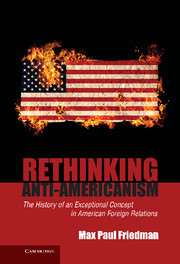2 - Americanism and Anti-Americanism
Published online by Cambridge University Press: 05 November 2012
Summary
The 100% American is 99% idiot.
– Routinely misinterpreted remark by George Bernard ShawBy the close of the nineteenth century, the concept of anti-Americanism was firmly established in American political discourse, and the struggle over its meaning was subsiding. Although “anti-Americanism” sometimes referred to diplomatic or popular resistance to U.S. expansion, especially after the War of 1898, its deeper, dual significance would expand during the twentieth century, as a rightist charge of disloyalty directed against domestic critics on the one hand, and as an ascription of irrationality to uncooperative foreigners on the other. Wars, hot and cold, shrank the political space for dissent and sharpened the sting of the anti-American label, even as “anti-Americanism” flourished as a category of analysis consecrated by journalism, academia, and government. By the second half of the century, anti-Americanism had become a fixed idea that would permanently distort Americans’ perceptions of national politics and international relations.
Overseas, the frequency with which writers invoked America as a point of reference grew in proportion to the country’s growing economic and military power. Negative and positive depictions of the United States became a regular feature of social and political debates in many countries, raising the question of whether foreign criticism of U.S. society revealed an ideological anti-Americanism cloaking opposition to modernity and democracy, as many of today’s scholars believe, or reflected indigenous disputes at a time of social change in which America functioned as a vivid symbol. The accusation of “anti- Americanism” in domestic politics, meanwhile, became above all the rhetorical weapon of choice for national chauvinists, and others who used it unreflectively became unwitting contributors to the reinforcement of an exceptionalist stance.
- Type
- Chapter
- Information
- Rethinking Anti-AmericanismThe History of an Exceptional Concept in American Foreign Relations, pp. 52 - 86Publisher: Cambridge University PressPrint publication year: 2012



